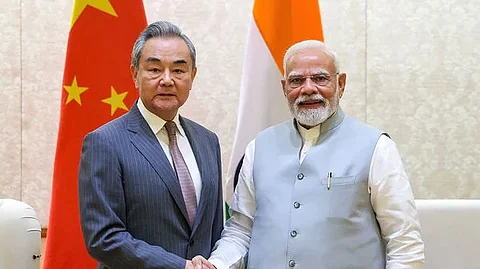

India and China on Tuesday agreed to resume direct flights and expand trade and investment flows as the two countries work to repair ties strained by the 2020 border clash.
The moves come as both Asian powers cautiously warm ties against the backdrop of US President Donald Trump’s unpredictable foreign policy. Prime Minister Narendra Modi, who called stable India–China ties vital for “regional and global peace,” will travel to China later this month for the Shanghai Cooperation Organisation summit—his first visit in more than seven years.
Modi met Chinese Foreign Minister Wang Yi in New Delhi on Tuesday, with both sides agreeing to restore direct flight connectivity, revive suspended dialogue mechanisms and strengthen economic cooperation. The Ministry of External Affairs (MEA) said the steps aim to stabilise ties and facilitate two-way trade and investment flows.
Wang Yi was in New Delhi from August 18–19, where he co-chaired the 24th round of Special Representatives’ (SR) talks on the boundary question with National Security Advisor Ajit Doval, held bilateral discussions with External Affairs Minister S. Jaishankar, and called on Prime Minister Modi.
The MEA said both sides would restart direct flights—suspended since the Covid pandemic—though no date was announced. They also agreed to reopen border trade at three points, ease visas, and facilitate greater investment.
Yi's discussions covered troop pullbacks along the Himalayan frontier, boundary delimitation, and mechanisms for ongoing consultation. A working group will coordinate on eastern and middle sections of the disputed border, with further talks on the western sector planned. Beijing confirmed the next round will be held in China in 2026.
Wang told Jaishankar that Beijing was addressing India’s concerns over access to fertilisers, rare earths and tunnel boring machines—critical for agriculture and infrastructure.
Chinese officials maintain hydropower projects in Tibet pose no major risk to the environment or downstream supplies, though both India and Bangladesh remain wary.